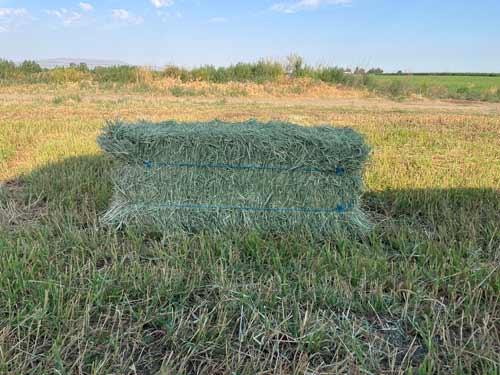Supporting Kennewick’s Livestock: A Local Hay Supplier’s Guide to Year-Round Quality Feed
When it comes to raising healthy livestock, providing the right kind of hay at the right time of year is crucial. As a livestock owner in Kennewick, WA, ensuring year-round access to high-quality feed is key to your animals’ wellbeing and productivity. With changing seasons and varying nutritional needs, it’s important to understand the local options for hay for sale in Kennewick, WA and how to keep your livestock in optimal health.

(Timothy Hay Bale)
We’ll explore how local hay suppliers play an essential role in maintaining consistent, quality feed throughout the year, share tips on choosing the right hay for each season, and offer insight into what sets local hay apart from imported options.
Why Supporting Local Hay Suppliers Matters
Choosing local hay suppliers in Kennewick and the Tri-Cities region is not only convenient but also offers several benefits for your livestock. Locally sourced hay ensures that you’re providing feed grown in a similar climate, which can be better suited to the nutritional needs of your animals. Additionally, supporting local farms strengthens the regional agricultural economy, helps reduce transportation costs, and ensures a fresher product.
By purchasing hay from nearby sources, you also build relationships with local farmers who understand the specific challenges and needs of Kennewick’s livestock community. These relationships provide peace of mind, knowing that you have a reliable source for feed, especially during periods of high demand.
Seasonal Considerations for Hay Selection
Kennewick’s climate, with its hot summers and cold winters, means that livestock have varying dietary needs throughout the year. Understanding these seasonal differences can help ensure that your animals receive the right balance of nutrition, no matter the time of year.
Summer: Providing Lighter, Nutrient-Dense Hay
In the summer months, livestock tend to require a lighter feed due to reduced activity and the availability of fresh pasture. However, animals still need access to nutrient-dense hay to support healthy digestion and maintain their energy levels. Alfalfa hay is an excellent choice during this period, as it is packed with protein and energy, supporting lactating animals, young livestock, and those that may need an extra boost.
Local suppliers often carry alfalfa hay, which thrives in the climate of Kennewick and the surrounding Tri-Cities area, making it a perfect option during the hotter months. You’ll want to seek out hay that has been harvested properly and dried efficiently to ensure it retains its full nutritional value.
Fall: Stocking Up for the Winter
As fall approaches, it’s time to think about stocking up on hay to last through the winter. With the grass beginning to die down, livestock will start relying more heavily on stored feed. Orchard grass hay is a great option during this transition, as it is highly palatable and provides a good balance of nutrients without being too rich.
In Kennewick, you’ll find many farm supply stores offering orchard grass hay for sale, and local suppliers are well-prepared to meet the increasing demand as the cooler months set in. Fall is also an excellent time to evaluate your hay storage solutions and ensure that your supply will remain fresh and dry throughout the winter.
Winter: High-Fiber Hay for Cold Weather
Winter is the most challenging season for livestock owners when it comes to providing high-quality feed. As temperatures drop, animals require more energy to maintain their body temperature, making high-fiber hay essential for keeping them warm and healthy. Timothy hay is a popular choice for winter feeding, as it provides the fiber necessary for good digestion and energy production.
If you’re in need of hay for sale in Kennewick, WA, local suppliers can provide the right kind of Timothy hay that’s been grown and harvested to withstand the region’s harsh winters. Be sure to check for hay that is free of mold and moisture damage, as these issues can compromise the quality of the feed and pose health risks to your livestock.
Spring: Transitioning to Fresh Pasture
As the winter chill fades and spring arrives, many livestock owners look forward to letting their animals graze on fresh pasture. However, the transition should be gradual to prevent digestive issues. During this time, it’s wise to continue providing hay while slowly introducing animals to the new grass.
Spring is also a time for replenishing hay supplies that may have been depleted over the winter. At this point, consider choosing hay varieties like alfalfa or orchard grass that will complement the fresh pasture and give your animals a balanced diet as they adjust to the changing environment.
Benefits of Year-Round Hay from Local Suppliers
Maintaining a steady supply of hay throughout the year is crucial for livestock owners in Kennewick. By working with local hay suppliers, you’re more likely to have access to high-quality feed that’s suited to the local climate and soil conditions. Here are some key benefits of sourcing hay locally:
- Fresher Hay: Local hay is often fresher because it doesn’t need to travel long distances. This means the nutrients are better preserved, providing superior nutrition for your livestock.
- Cost Savings: Local hay can be more affordable since it doesn’t require extensive shipping or handling fees. Plus, you’re cutting down on the environmental impact of transporting hay from farther locations.
- Tailored Nutrition: Farmers in Kennewick and the Tri-Cities area grow hay that is well-suited to the region’s climate, ensuring that it meets the specific nutritional needs of your animals.
- Dependable Supply: Building relationships with local suppliers ensures a reliable source of hay year-round, helping you avoid shortages or price hikes during peak seasons.
How to Store Hay for Maximum Quality
Proper storage is essential for keeping your hay in optimal condition, especially during Kennewick’s hot summers and cold winters. When storing hay, it’s important to keep it in a dry, well-ventilated area that is protected from moisture. Here are a few tips to help you store your hay efficiently:
- Elevate the Hay: Use wooden pallets or other barriers to keep the hay off the ground, which helps prevent moisture from seeping into the bales and causing mold.
- Cover the Hay: Use tarps or a weatherproof covering to shield your hay from rain or snow, but make sure the covering allows for some airflow to prevent moisture buildup.
- Monitor the Temperature: In warmer months, hay can become a fire hazard if stored in direct sunlight or in areas with poor ventilation. Make sure to keep the area cool and dry to avoid overheating.
- Check for Pests: Mice and other pests can damage your hay, so regularly inspect your storage area and set traps or deterrents as needed.
Conclusion
Supporting Kennewick’s livestock requires a consistent supply of high-quality hay, and local suppliers are an essential part of this process. By choosing locally sourced hay, you’re not only ensuring that your animals receive the best possible feed, but you’re also contributing to the sustainability and success of the region’s agricultural community.
Whether you’re stocking up for winter, transitioning to spring grazing, or simply looking for the best feed for your livestock, working with local hay suppliers in Kennewick ensures that your animals stay healthy and productive year-round. Visit local farm supply stores in Kennewick and explore the variety of hay for sale to find the perfect feed for your livestock needs.

